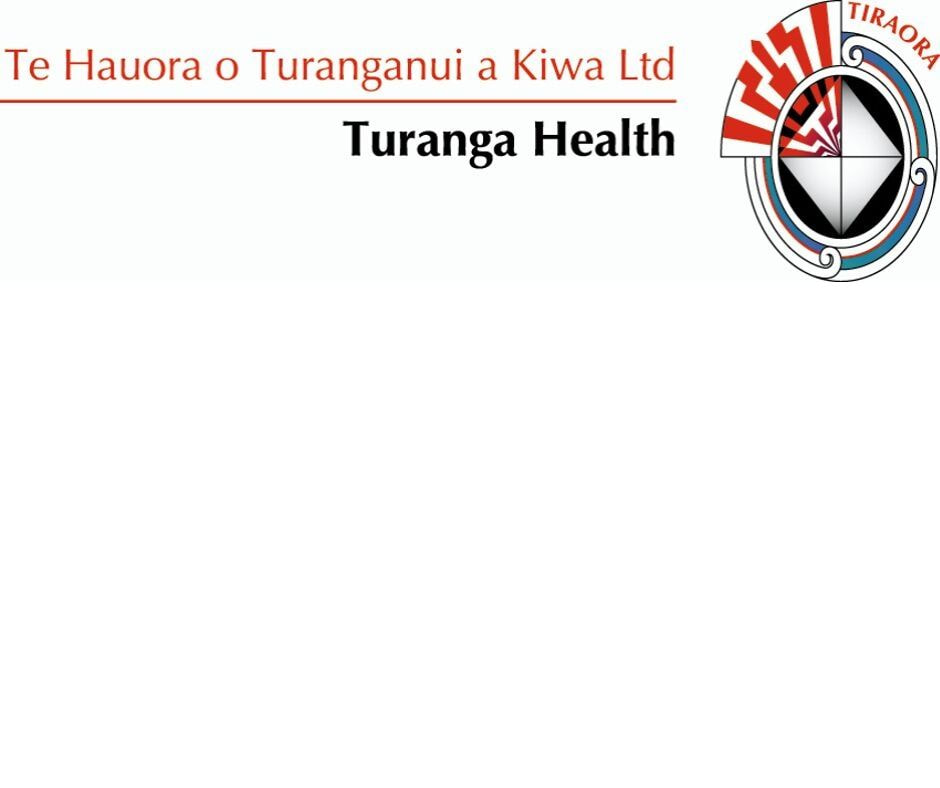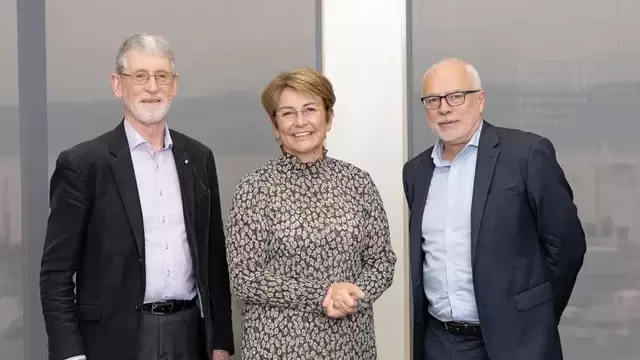 PARTICIPATING in a Government inquiry can be daunting but it’s a privilege and our duty, says Turanga Health researcher Dr Shirley Keown. “There seems little doubt that inquiries into disaster events in Aotearoa have generally been useful and so it was important that we take up the offer of a seat at that table.” Dr Keown represented Turanga Health at the Covid-19 Lessons Learned Commission of Inquiry in Tairāwhiti this month. Chief executive Reweti Ropiha says Dr Keown’s professional presentation gained the respect of participants. “Shirley articulated Turanga Health’s wealth of knowledge about vaccination settings, service mobility and equity, and the priority groups we targeted, in a thoughtful, robust way. It was well-received,” he says. During the pandemic, Turanga Health led the way in community vaccination, hosting 185 drive-through and 161 static vaccination clinics between May 2021 and October 2022. Of all Māori vaccinated in the region, Turanga Health was responsible for immunising nearly a quarter of the whānau. “Given this involvement, and our kaupapa, which was to engage and connect with Māori in a way that embodied the whānau experience, it was important we share our learnings during the inquiry,” says Dr Keown. “Getting to do the mahi we wanted to, wasn’t always straight forward at the time, and so this was a chance to reflect and share our own wisdom and information.” A Royal Commission inquiry is the highest inquiry available in New Zealand. They take an in depth look into any matter of public importance or concern to the Government of the day. There are currently three underway in this country: Covid-19 Lessons Learned; Historical Abuse in State Care and in the Care of Faith-Based Institutions; and the Response to the North Island Severe Weather Events. The Covid-19 inquiry will help New Zealanders and the Government be prepared as possible for when something like Covid-19 next hits. Dr Keown and iwi representatives presented feedback to the three Covid-19 inquiry commissioners: epidemiologist Professor Tony Blakely, former member of parliament Hekia Parata, and economist John Whitehead. While some Royal Commission inquiries can be done very formally with official hearings similar to a court process, this one is being managed more informally with commissioners travelling up and down the country to extract out the lessons. Prof Blakely says everyone in New Zealand, and indeed many Kiwis living overseas, was impacted by Covid-19, and it’s for this reason the inquiry’s scope is broad. “There is a wealth of information we have already begun to analyse, which will help inform the inquiry. But just as important is hearing from the many organisations, communities, and individuals across Aotearoa about their involvement, experiences and insights of the pandemic.” During the meeting the commissioners learned more about Turanga Health’s timing, flexibility, and scale of its vaccination campaign. For example, Turanga Health was the first iwi health provider to train kaiāwhina vaccinators as part of the urgent and necessary workforce, thereby ensuring whānau faces in whānau spaces. As well as sharing Turanga Health’s lessons learned, Dr Keown says there was a chance to talk about future challenges such as raising childhood immunisation rates, and the need for iwi to be involved at the co-decision time for public health initiatives, and not just with co-design. “It’s important that we take all these learnings and don’t let people and funders fall back into old systems. As tangata whenua our notion was to serve the community. We had the audacity to be audacious during the pandemic and think outside the box. The unfortunate reality is that there will be another pandemic and we bring a well of experience to managing in that space.”
0 Comments
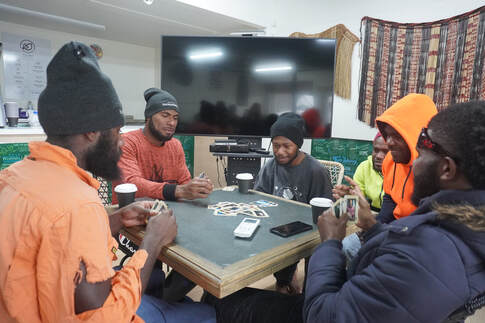 After their vulnerabilities were exposed during Cyclone Gabrielle, Pasifika men working in the region’s orchards, vineyards, and crops, are better connected to welfare and health services thanks to Turanga Health. Turanga Health continues to support Recognised Seasonal Employer (RSE) workers nine months on from Cyclone Gabrielle, says chief executive Reweti Ropiha. “Being able to give a stable and trusted voice to this vulnerable community is one of the good things to come out of the terrible weather events of 2023.” The region’s RSE workers, who are all male, live mainly in shared or communal accommodation. They come from Pacific Islands such as Samoa, Fiji, Tuvalu, Kiribati, Vanuatu, Tonga, and the Solomon Islands. When Cyclone Gabrielle hit, they had the same needs as many people: food, water, cash, and communications, but very few people to help them. They also required winter clothes and bedding, and recreational items. Mr Ropiha says Turanga Health stepped up and activated a response to meet the emergency needs of 161 workers. “We used our existing relationships with the companies who employ them and funnelled staff and supplies quickly out there.” Turanga Health staff also worked with the Pasifika Medical Association Group, which flew in Pasifika doctors and a physiotherapist, so RSE workers could receive medical check-ups. The checks happened at RSE workers’ accommodation, and at Turanga Health’s Manawaru hub in Elgin. Staff from Te Whatu Ora and the New Zealand Police were also recovery partners. Now, nine months on, Turanga Health continues to work with the workers and the wider Pasifika community, focusing on improved access to dental care, health services, and opportunities for gathering as a community. “We’ve also carried out research into the region’s Pasifika community and are currently using this data to address other identified gaps in health and welfare services.” Mr Ropiha tabled Turanga Health’s 2023 annual report during the iwi health organisation’s annual general meeting this week, and emphasised “it was a year of two halves”. “The first six months between July and December 2022, gave us a chance to reignite services that had been impacted by the pandemic, and consolidate what we had learned in the vaccination space.” But the game changed in the second week of February 2023 when the cyclone hit. “Our mahi was like that of our Covid-19 response. We were able to pivot quickly.” In the first four days after Cyclone Gabrielle, Turanga Health: contacted 816 whānau and offered support; cooked 1,000 meals; delivered 230 kai parcels; made 50 medication deliveries; and transported 56 whānau to a preferred location or to healthcare. In collaboration with other organisations, it helped relocate two generators, 8 starlinks, and one atm around the region. Then, just weeks later, the organisation was back into hosting its large drive-through whānau vaccination events offering Covid-19, influenza, childhood and hapū māmā vaccinations in one place. During one day alone in April, Turanga Health administered nearly 10 percent of the country’s total Covid booster immunisations in just four hours. “Not bad for a small iwi health organisation in a region battered just weeks before.” Read the annual report. 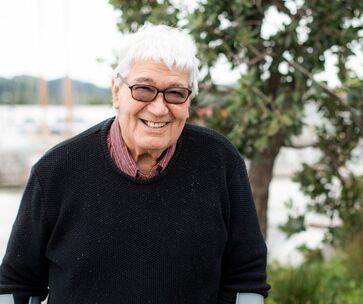 Whakahawera Rere Kite Pakanga Kerr, a big man who leaves behind a massive legacy in iwi health, passed away on Sunday 21 May, 2023, aged 82. Known as Libby – after his uncle was wounded in Libya on the day of his birth in 1941 – a quarter of a century of service made him a cherished member of Turanga Health. Turanga Health is an iwi health provider and general practice with 95 staff including one GP, 19 nurses, and 58 kaiāwhina, including many who can vaccinate. Staff come from many walks of life and backgrounds, helping manage the health care needs of whānau in their own homes or community settings. Turanga Health was central to mobilising services and vaccinating this region’s population during the Covid-19 pandemic. Turanga Health chief executive Reweti Ropiha says Libby made his mark from when he started in 1999. He was someone who could work with older males and walk their health journey alongside them. Libby became a confidant and gave tāne confidence. “His life experiences ensured he had a lens on the world that informed his work for Turanga Health, and in turn, Turanga Health’s approach for this region.” As well as serving as kaumātua, he also spent six years overseeing the Vanessa Lowndes Centre for whānau with physical and or mental health issues, and was a mentor for a young Reweti Ropiha. He worked for the organisation until this year. Libby, Ngāpuhi, Ngāti Porou, Rongowhakaata, Ngai Tāmanuhiri, Te Aitanga a Māhaki, Tūhoe, spent his early work life contributing to the region’s primary industries. He plucked tobacco leaves, loaded maize cribs, picked fruit, and butchered meat in the freezing works. In 1985 he had become a security guard at New Zealand's newest health facility, Gisborne Hospital, where he saw things he says, “were both good and bad”. On the “good” side, he enjoyed spending time in Ward 11, talking and interacting with patients. On the “bad”, he often felt tangata whaiora (people seeking health) were not treated with the care and consideration they deserved. With that as his driving force, Libby's redundancy some years later was turned into a positive when he used his experiences to work with the Health and Disability Commission. Then, through Turanga Health, Libby committed himself to doing what was right in Turanganui-a-Kiwa. Whether it be a phone call, kanohi ki te kanohi contact, or something more subtle, Libby called upon an extended breadth of relationships to help Turanga Health navigate the early days of delivering its services. Reweti says Libby’s drive to help whānau intensified during times of trial. Be it earthquakes, floods, pandemics, or power outages, Libby demanded that whānau continue to be supported. “There was no compromise on this. He would say we can do it in real time, open the doors as quickly as possible.” Turanga Health’s whānau approach to health care owes a lot to Libby. When designing new health programmes, population health kaiwhakahaere Dallas Poi says Libby helped her engage with a wide variety of community leaders. “He was there as a backstop, a guide, and gave me insights on who I needed to go to.” He always pushed her to broaden the organisation’s horizons. Why stop at that marae and that school? “As the years went by, I further understood the importance of Papa Libby and the role he played.” Libby’s Turanga Health office was small but central. His beloved country music would blast loudly from the tiny room, and despite possessing no real singing ability, he would belt out Merle Haggard tunes while sipping coffee from a huge mug. Nearby administrative staff, including Dallas, would get hōhā (exasperated), but his cheeky smile would always win them over. In the last few years Dallas and Libby shared a secret supply of biscuits in his office drawer. Dallas would sneak biscuits when he wasn’t there. Later, with mock surprise he would complain to Dallas that a kiore (rat) had been stealing the stash. Radio announcer and Turanga Health instructor Walter ‘The Wiz’ Walsh met Libby when he was a Te Runanga o Turanganui a Kiwa trustee overseeing iwi radio station Te Kakano. Later, when he was a Turanga FM breakfast announcer, Walter would take off-air song requests from Libby. “We nicknamed him Maunga Teitei (high mountain) so nobody would know it was him jumping the queue.” Libby never backed away from responsibility. He loved his whakapapa, was a unionist and a retired Justice of the Peace. He pushed for Turanga Health staff to study waiata and insisted on having iwi taonga in the office so staff remembered who their mahi was for. He wasn’t afraid to speak his mind and if he was frustrated the odd bit of kangakanga (cussing) could slip out. Throughout the years Libby was a passionate family man . . . he and his wife of more than 55 years, Mereaira, have eight children, 12 grandchildren, and a growing number of great-grandchildren. His Lytton Rd whare is a key hub for whānau. As long as you didn’t disturb him while he was watching Emmerdale Farm, he loved nothing more than a cup of tea and a natter. As his mobility was compromised in recent years, his granddaughter’s husband, Henry Lamont, drove Libby to and from Turanga Health’s Derby St office. Reweti says right up until his last few weeks Libby continued to be a mentor. Libby pushed him and Turanga Health to have the agility, guile, and wisdom of an eel from Lake Repongaere. “It’s because of this advice that Turanga Health has for years been able to put faces into Turanga spaces and support whānau wherever they may be. Libby wasn’t interested in being associated with a Waituhi garden snail.” ends 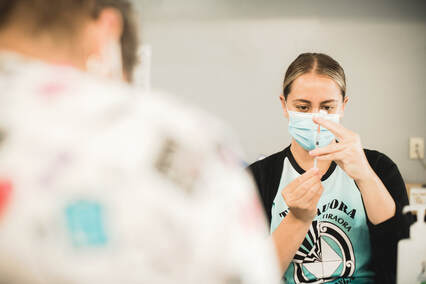 TURANGA Health continues to receive recognition for its Covid-19 response by being included in two prominent nationwide studies. The te Tairāwhiti iwi health provider was innovative and agile during the first two years of its Covid-19 response creating whānau-friendly vaccination settings leading to increased numbers of iwi immunised. Between 2020 and 2022 Turanga Health was “punching above its weight” says chief executive Reweti Ropiha. While the health sector, other regional providers, and the Government lacked confidence to work at pace, Turanga Health shaped and designed services that made an impact. In July 2021 just 11,230 eligible people in Tairāwhiti had received their first dose of the vaccine, including 3799 Māori. By the end of June 2022 34,339 eligible people had received their first dose including 17,073 Māori. At the time former Te Whatu Ora Tairāwhiti district director Jim Green said it was “a remarkable turnaround.” Since the pandemic, Covid-19 response research has moved swiftly. When there was a chance to be involved, Turanga Health felt it had an obligation to do so. “It was important that Turanga Health put up its hand and say ‘yes’ to projects like this so iwi health providers are in a stronger position to do more for Māori in the future,” says Mr Ropiha. Turanga Health’s work has been included in a Ministry of Health-funded study looking into the ongoing impacts of Covid-19 and future pandemic responses. Twenty-three studies form part of the national project, delving into topics such as aged care residents, Pacific peoples, digital contact tracing, and mandates. For its part, Turanga Health is looking at the response of its staff and services between 2020 and 2022, what worked well, and what impact that had on equity of services for Māori. The local study is called Tūranga Tangata Rite. The local study includes an exhaustive review of all the work carried out between 2020 and 2022, as well as interviews, surveys, and wananga with kaimahi and stakeholders. Public feedback collected in real time as ‘whanau voice’ will also be collated to help recapture the experiences of service users. “Tūranga Tangata Rite will uncover what equity of access for Māori should look like,” says Mr Ropiha. Turanga Health’s approach was about flexibility and hospitality, or Turanga faces in Turanga spaces. “We now have an incentive to share any available tools and knowledge to ensure that a disruption like Covid has the smallest impact possible. We’re not saying we had all the solutions, but this pandemic has taught us that we were much more relevant than we thought.” The second project Turanga Health is involved in looks at how Māori health providers can measure the impact and social value of their activities, and whether the tool known as Social Return on Investment might be the way to do it. This study is funded by Health Research Council of New Zealand. “Making a difference to iwi health outcomes is the main objective of these research projects now.” |
Media Releases
Email us if you want to receive our media releases. Archives
February 2024
|

